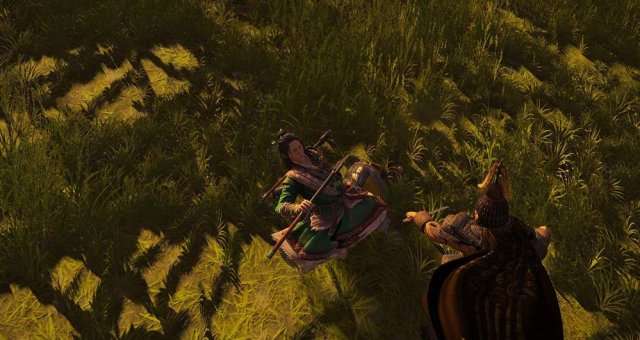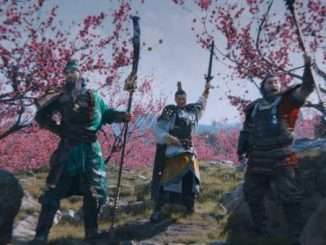
Other Total War: Three Kingdoms Guides:
- Getting Started.
- Beginner’s Guide (Tips and Tricks).
- Advanced Tips and Tricks.
- Damage Types and Effects.
- Spies & Espionage Guide.
- Zone of Control Guide.
- Administrators Guide.
- Commandery Guide.
- Fortifications Guide.
- Formations Guide.
- Factions Guide.
- Terrain Guide.
- Fatigue Guide.
- Morale Guide.
- Armies Guide.
- Unit Abilities.
- Battle Types.
- Siege Guide.
- Court Guide.
- Duels Guide.
- Unit Types.
Diplomacy
All credit goes to CA_OtherTom!
Diplomacy is the process by which you manage relations with other factions. Much can be achieved through diplomacy that would otherwise be impossible. Factions can trade ancillaries, resources, territory and food, arrange marriages, form coalitions, lend and borrow money, threaten or declare war, annex other factions non-militarily, and much more.
The face-to-face nature of diplomacy represents a close-proximity working environment, and can therefore influence character relations between two warlords enagaging in diplomacy. Warlord personalities also play a key part in diplomacy, as their personalities combine with their faction’s needs to dictate their decisions in the campaign game.
When you open the diplomacy panel, there are two main ways to arrange diplomatic deals: via the negotiate menu or the quick deal menu. You can toggle between these at the top of the diplomacy screen.
There are many diplomatic options, most of which are self-explanatory when you mouse over them. Some core concepts, mechanics and options merit deeper explanation however.
Attitude
Diplomatic attitude is the measure of another faction leader’s opinion of you, and is key to achieving beneficial deals via diplomacy. You can view a faction leader’s attitude towards you by mousing over the colour-coded masks in the factions list in the diplomacy panel. This shows a breakdown of the reasons for each warlord’s attitude, ranging from hostile (deep red) to trusted friend (deep green).
The more a faction leader approves of you, the more likely he’ll be to agree to your deals. The more deals you do with him that he likes, the more he’ll like you.
There are many factors which improve or reduce diplomatic attitude. Generosity through gifts of money, long-term peace, and being part of the same alliance all boost diplomatic attitude for example. Being at war, doing deals with a faction’s enemies, and trespassing on another faction’s territory without first seeking a military access agreement with them are some actions that will reduce attitude.
A warlord’s diplomatic attitude towards another is influenced not only by actions, but by the consequences of those actions on related third parties. For example, if you have a trade agreement with Warlord A, who is friends with warlord B, and you go to war with warlord B, Warlord A’s diplomatic attitude towards you will fall, potentially risking the trade agreement you have with them.
Trustworthiness
Certain actions can impact how much other faction leaders respect and trust you. Treacherous acts, such as promising never to annex a vassal and then annexing them, or breaking a timed loan agreement, or attacking a coalition partner for example, constitute acts of treachery, and will reduce the trust that other leaders place in you. Your trustworthiness rating is noted below your faction leader’s name and faction rank in the diplomacy screen, and can be moused over for further information.
Trustworthiness does not affect diplomatic attitude, but is taken into account alongside diplomatic attitude during negotiations. For example, it’s perfectly plausible for a faction leader to have a very high diplomatic attitude towards you but, due to your treacherous actions in the past, he will be reluctant to sign a deal with you. He likes you – he just doesn’t trust you!
When your trustworthiness rating has been reduced, it will automatically recover over time, provided no more treacherous actions are taken.
Quick deal
The quick deal menu shows a list of many common diplomatic options available at any given time, and with who. It’s a time-saving way of sorting which faction leaders which will definitely do particular deals, which faction leaders might, and which faction leaders won’t even entertain the idea. Multiple deals can be secured with multiple factions in a very short time via the quick deal menu.
To arrange a deal with a faction leader marked ‘maybe’, the player will have to negotiate.
Negotiate
Conducting a negotiation is the process of presenting another faction leader with a request or offer, scrutinising their reaction, and fine tuning the deal to find a mutually acceptable set of terms. To do this, simply select a warlord from the faction list in the diplomacy screen, click negotiate, select the category of offer you wish to make, then select the diplomatic option you wish to request. Any offers which are not possible are greyed out; you can mouse over greyed-out options to reveal the reasons why.
When you present a faction leader with an offer, it is placed in the offer box at the bottom of the screen, along with a number which indicates how much the other faction leader values your offer. The number may be a red, negative number (undesirable or costly to the other faction leader) or a green, positive number (desirable or beneficial to the faction leader). The art of diplomacy is finding mutually acceptable terms to get the deal signed if they don’t like it, or seeing how much more you can get out of the other guy if they do like it.
The desirability of any deal you propose is influenced by their diplomatic attitude towards you, your respect rating, and whether the deal you offer aligns with the faction leader’s strategy at the time.
If the number is negative, this doesn’t mean that the faction leader is ruling out the offer, but that you must add positive, desirable offers in order to cancel out the negative value, and sweeten the deal to a point where he’ll accept it. This may involve adding a cash payment, food, a valuable ancillary, a diplomatic treaty, or any combination of desirable offers in the diplomatic menu. When the negative number rises to zero, the faction leader will be willing to agree. It’s possible that a negative value is so large, indicating a deep unwillingness to deal, that the cost of balancing the number up to zero will be prohibitively expensive. Only by experimentation, through adding or altering offers, can you find terms acceptable for both parties – or conclude that the cost may be too great, and write it off altogether.
If you suggest an offer and the result is a positive number, the other faction leader finds it desirable. The higher the number goes above zero, the greater your bargaining power, as you may be able to pack in further requests, provided the number doesn’t go below zero. Experimenting with different offers might net you more than you had originally bargained for.
If you don’t wish to manually negotiate, you can click the ‘make this work’ button. This will reveal a baseline requirement from the other party in order to accept your offer. This can often be a useful point from which you can begin modifying your offer.
Diplomatic options
The deals you can arrange through diplomacy are many and varied. They fall into five distinct categories: War, Peace, Trade and Marriage, Vassals, Alliances and Diplomatic Treaties. Mouse over an option to get an explanation of it.
Many options will be greyed out. This is simply because they are not applicable in the current circumstances. For example, if you have no vassals of your own, and have met no other factions who are vassals of others, vassal options will be unavailable.
If you are unable to achieve a specific deal with a faction leader, you can always come back on a later turn and try again. If it’s something you have your heart set on, perhaps it’s worth some efforts on your part to improve their diplomatic attitude towards you, by securing lower-level deals, offering them cash gifts, or joining in their wars for instance.
Coalitions & Military Alliances
Coalitions and alliances are military agreements between factions. Two factions may initially form one, and further factions may be invited, or can apply to join. Being part of such a power bloc can bring great benefits, such as shared defence, but some relationship management is also required with your allies.
All parties in a coalition will gain a boost to their diplomatic attitudes towards one another simply by signing the pact. Diplomatic attitudes will also improve between allies over time if you are at war with a common enemy. Armies may gather military supplies when stationed in coalition or allied territory, thereby extending the operational reach of armies. Armies can also switch out characters and retinues in allied territory just as they would in owned territory.
Voting
Members of a coalition or alliance who want to execute actions which directly affect their fellow members must submit to a vote. Both coalitions and alliances require an all-parties vote if a faction applies to join, or is invited by an existing member. Members can also call a vote to eject another member. Other actions may or may not require a vote depending on whether the alliance is a coalition or a military alliance; if a vote is required, it will be noted in the diplomacy option.
Voting can have an impact on diplomatic attitudes between members. If a member proposes an action, the result of the subsequent vote affects the attitudes of the voters in line with how they voted. If the outcome matches the way they voted, their attitude will improve towards the Warlord who proposed the action. If the vote doesn’t go their way, their attitude will fall. Sometimes it might be worth lending your support to an initiative you’re not entirely comfortable with in order to keep your relations with other members strong.
Coalition
A coalition is a non-binding form of alliance, as there is no obligation of mutual defence. This leaves coalition members free to conduct private wars with no commitment required from the others, though a member can of course negotiate military aid with a fellow coalition member in the normal manner.
Your warlord’s faction rank must be second marquis or better to form a coalition, and you do not need a very high diplomatic standing with another warlord to form one. Members gain a mutual boost to their diplomatic attitudes when joining, and a small attitude improvement over time. A member whose faction rank is marquis or higher may call a vote to transition the coalition into a full military alliance.
Military Alliance
A military alliance is a binding agreement, as a member can call on fellow members to join them in their wars. This is not put to a vote; all members are contractually obliged to comply. This simple rule makes military alliances considerably more powerful than coalitions, as declaring war on one member potentially means entering a war against them all. Individual members may still choose to conduct private wars without drawing their fellow members in however.
Your faction rank must be marquis or better to form a military alliance, and you’ll need a relatively high diplomatic standing with another faction to form one, or transition into one from a coalition. The mutual diplomatic attitude gain for joining a military alliance, and the mutual attitude gain over time, is greater than that of a coalition.





Be the first to comment